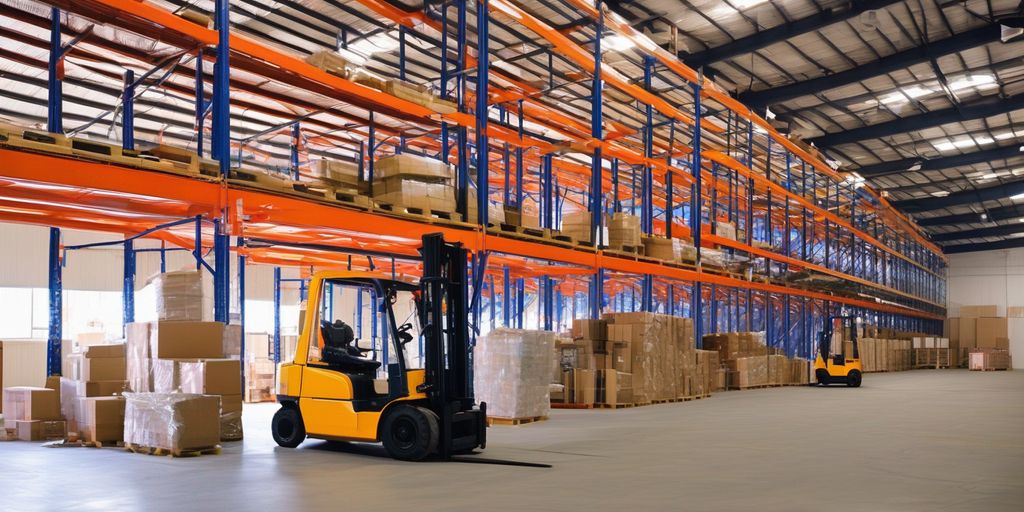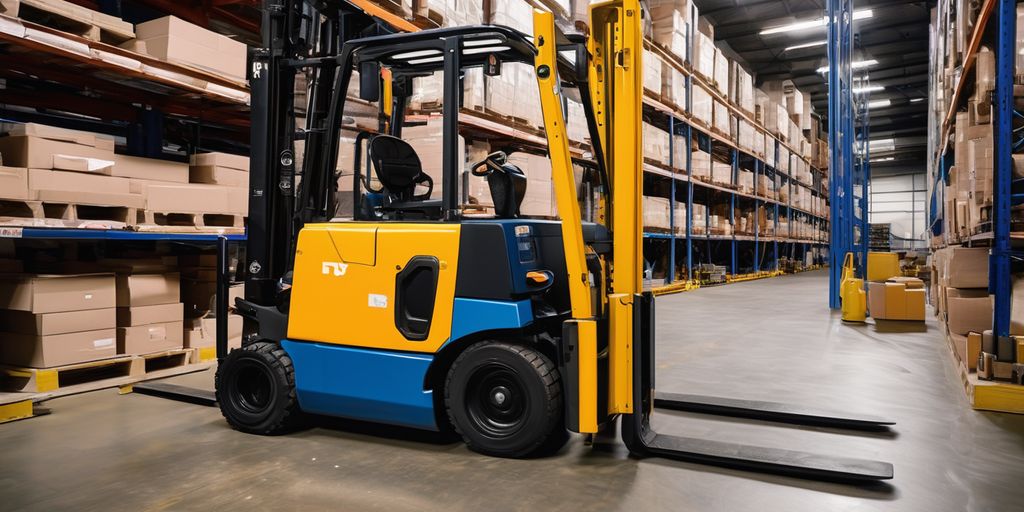In an era where sustainability is at the forefront of business practices, the material handling sector is embracing eco-friendly solutions to minimize environmental impact. At Lonestar Forklift, we are committed to driving innovation in material handling while prioritizing sustainability. This article delves into the evolving landscape of sustainable forklift practices, focusing on the adoption of green solutions for forklifts and logistics operations.
Key Takeaways
- Evaluate your material handling needs to identify opportunities for integrating eco-friendly forklifts.
- Provide comprehensive training for operators to ensure efficient and effective use of eco-friendly forklifts.
- Establish proper charging infrastructure to maximize the benefits of electric forklifts.
- Prioritize the use of recyclable materials and design strategies that enhance the lifespan of forklifts.
- Explore alternative fuel options such as hydrogen fuel cells and biofuels to diversify sustainability efforts.
Implementing Eco-Friendly Forklift Solutions

Eco-friendly forklift solutions are on the rise and aim to mitigate impacts across a range of industries while enhancing operational efficiency.
Assessment of Material Handling Needs
Evaluating your material handling needs is the first step. Identify areas where eco-friendly forklifts can be integrated effectively. This assessment helps in understanding the specific requirements and benefits of adopting sustainable practices.
Operator Training for Eco-Friendly Forklifts
Training operators is crucial to ensure they are familiar with the specific features and requirements of eco-friendly forklifts. Proper training can lead to more efficient use and longer lifespan of the equipment.
Establishing Charging Infrastructure
If opting for electric forklifts, establishing a proper charging infrastructure is essential to maximize their benefits. A well-planned charging setup ensures minimal downtime and optimal performance.
Implementing eco-friendly forklift solutions not only helps in reducing the environmental footprint but also enhances the overall efficiency of material handling operations.
Eco-Friendly Materials and Design

Sustainability isn’t just about power sources; it’s also about the materials used in manufacturing. It is important to prioritize eco-friendly materials and design practices. This includes the use of recyclable components and the implementation of design strategies that enhance the lifespan of forklifts, reducing the need for premature replacements.
Energy-Efficient Technologies in Forklifts

Sustainable forklift practices go beyond the choice of power source. Look for forklifts that are equipped with energy-efficient technologies to optimize performance while minimizing energy consumption. Features such as regenerative braking and smart charging systems contribute to a more sustainable and cost-effective operation.
Alternative Fuels for Forklifts

Exploring alternative fuels is a crucial step for businesses aiming to enhance sustainability in their forklift operations. Forklifts that run on biofuels, hydrogen, or compressed natural gas offer reduced emissions compared to traditional gasoline or diesel-powered models. These alternatives provide flexibility for businesses aiming to transition towards greener practices.
The Shift Towards Sustainability in Material Handling

The shift towards sustainability in material handling is more than just reducing emissions; it also involves minimizing waste production and maximizing the efficiency of resources. This article delves into the evolving landscape of sustainable materials handling, focusing particularly on the adoption of green solutions for forklifts and logistics operations.
Reducing Carbon Footprint
Reducing the carbon footprint in material handling is crucial. Companies are increasingly adopting eco-friendly practices to minimize their environmental impact. This includes using electric forklifts, which have advanced battery technology that offers longer runtime and faster charging, thus addressing downtime concerns.
Innovations in Forklift Technology
Innovations in forklift technology are driving the shift towards sustainability. The rise of electric forklifts is a testament to this trend. These forklifts are not only responsive and smooth-handling but also a good choice when ventilation is limited inside due to a lack of emissions during operation.
Industry Trends and Best Practices
The increasing push for sustainability and low-emissions equipment is driving up the global electric forklift sector. Companies are committed to driving innovation in material handling while prioritizing sustainability. As the industry evolves, the focus on reducing environmental footprints has become crucial. This includes adopting best practices such as:
- Using recyclable components
- Implementing energy-efficient technologies
- Training operators for eco-friendly practices
Sustainable materials handling is more than just reducing emissions; it also involves minimizing waste production and maximizing the efficiency of resources.
Types of Eco-Friendly Forklift Solutions

Eco-friendly forklift solutions are on the rise, aiming to mitigate impacts across a range of industries while enhancing operational efficiency. Below are some of the most prominent types of eco-friendly forklift solutions available today.
Electric Forklifts
Electric forklifts have gained popularity for their zero-emission operation. They run on rechargeable batteries, eliminating the need for fossil fuels and drastically reducing emissions. These forklifts also offer quieter operation and lower maintenance costs. Electric forklifts have emerged as a sustainable solution, offering zero-emission operation and lower operating costs compared to diesel-powered counterparts.
Hybrid Forklifts
Hybrid forklifts combine the benefits of electric and internal combustion engine (ICE) forklifts. They use a combination of battery power and traditional fuel, which can significantly reduce fuel consumption and emissions. This makes them a versatile option for various material handling needs.
Solar-Powered Forklifts
Solar-powered forklifts are an innovative solution that utilizes solar panels to charge their batteries. This not only reduces reliance on grid electricity but also promotes the use of renewable energy. Solar-powered forklifts are particularly beneficial in sunny regions where solar energy is abundant.
The adoption of these eco-friendly forklift solutions is a significant step towards reducing the carbon footprint in material handling operations.
Conclusion
As the material handling industry continues to evolve, the adoption of sustainable forklift practices is no longer just an option but a necessity. By integrating eco-friendly solutions such as electric forklifts, energy-efficient technologies, and the use of recyclable materials, businesses can significantly reduce their environmental footprint while also enhancing operational efficiency. The commitment to sustainability not only benefits the planet but also contributes to long-term cost savings and improved corporate responsibility. At Lonestar Forklift, we are dedicated to leading the charge towards a greener future, providing innovative solutions that align with the growing demand for eco-friendly practices in material handling.
Frequently Asked Questions
What are the benefits of using eco-friendly forklifts?
Eco-friendly forklifts offer numerous benefits including reduced emissions, lower operating costs, quieter operation, and compliance with environmental regulations. They also contribute to a company's sustainability goals and can enhance its reputation.
How do I determine if eco-friendly forklifts are suitable for my material handling needs?
Start with an assessment of your material handling requirements. Evaluate factors such as load capacity, frequency of use, and operational environment. Consulting with a forklift specialist can also help you identify the best eco-friendly options for your needs.
What types of eco-friendly forklifts are available?
There are several types of eco-friendly forklifts, including electric forklifts, hybrid forklifts, and solar-powered forklifts. Each type offers different advantages depending on the specific application and operational requirements.
What is regenerative braking in forklifts?
Regenerative braking is a technology used in forklifts to capture and reuse energy that would otherwise be lost during braking. This helps improve energy efficiency and extends the operational life of the forklift's battery.
How can I ensure my operators are trained to use eco-friendly forklifts effectively?
Provide comprehensive training programs that cover the specific features and operational requirements of eco-friendly forklifts. This can include hands-on training, safety protocols, and best practices for maximizing efficiency and sustainability.
What are the infrastructure requirements for electric forklifts?
Electric forklifts require a proper charging infrastructure, which includes charging stations and possibly battery swapping systems. It's important to plan for the installation of these systems to ensure efficient and uninterrupted operation.




Leave a comment
This site is protected by hCaptcha and the hCaptcha Privacy Policy and Terms of Service apply.